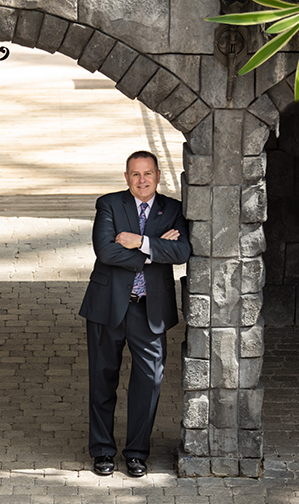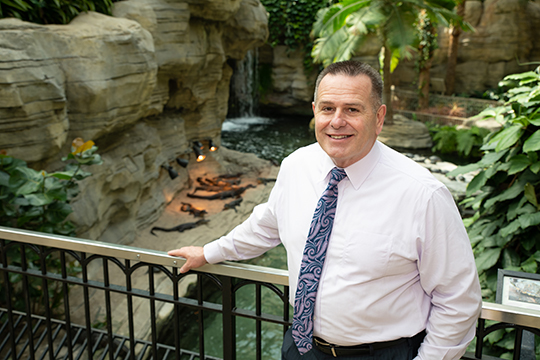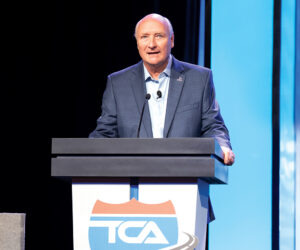The chairman of the board plays an extremely important role for a nonprofit organization. At the core of the chair’s duties, he or she generally presides over meetings of the board, collaborating with the chief executive to create a purposeful agenda and to set priorities, and helping to ensure sound and compliant governance of the organization. An effective chair goes beyond leading the board at board meetings. While the chair’s role is often filled by a strategic thinker who is equipped to follow through on ideas, an effective chair must also engage and facilitate participation from each board member and make sure the ideas, and the decisions, are collective. Over the years, the Truckload Carriers Association has been blessed to have had persons of character, wisdom, and integrity to fill that role. This year, that responsibility falls to Dennis Dellinger. In his first Chat With the Chairman, Dennis joins us to discuss issues facing the Association in the coming year, talks about key issues facing the industry, and calls for continued involvement on the part of TCA members.
Congratulations on becoming chairman of the Truckload Carriers Association. What does it mean to you to be chairman?
First, let me say, I am very humbled, and equally, I am very much honored. Ascending to the role of chairman can best be described metaphorically as a journey, and a great one at that! I have so many people to be thankful for in my life, both personally and professionally, that have prepared me to fill this role. I am excited to continue to work with the staff and leadership at the Truckload Carriers Association to progress the agenda of this Association as it continues to remain relevant in our industry.
In your acceptance speech at the recent convention, you noted that you weren’t raised a trucker nor born into this industry, but rather you are a product of deregulation, much like the company of which you are a part. Tell members about Cargo Transporters and about your career path that brought you to your current position.
My point was never to distract from those who were raised in the industry or were born to those great families that began many of the companies past and present. Instead, it was to give hope to the many that are not family members in our industry that there is a place for you if you persevere. Cargo Transporters was formed in December 1982 by what was then a regional truck rental and leasing company. It was intended to complement the leasing operation while growing and giving recognition to the locally owned company. I joined the company in April 1986 as a driver supervisor. At that time, we operated 36 trucks with six additional trucks soon to follow. As the company grew, I filled the roles of assistant general manager, vice president of operations, vice president, and then was named president in 2004. Most recently in 2019 the title of CEO was added to my president’s title. Today, Cargo Transporters operates 520 trucks and 1,782 trailers out of three locations in North Carolina servicing the 48 contiguous states.
What is going to be your focus as chairman?
I issued a call as the incoming chairman that the collective group, referring to our membership, become involved. I want our members to pride themselves in being part of something bigger and better. This is nothing new, but merely echoing past TCA leadership’s calls for involvement. I will continue to promote the platforms of advocacy, education, and image. TCA will thrive through membership involvement and excel by providing the setting for members to learn from one another. And finally, TCA will succeed by speaking in a unified voice. There is strength in numbers and truth in knowing the more people we gather toward one general cause, the better we will be in the end.
As you become chairman, what is your message to TCA members who are not actively involved in TCA conventions and programs?
I was guilty myself, years ago, of not being fully engaged. I was involved in benchmarking and attended the annual meetings, but still noncommittal when it came to committee meetings and those meetings outside of the general sessions. Barry Pottle introduced TCA to Wreaths Across America, which got my attention. I then got involved in TCA’s Communications and Image Policy Committee meetings, and things progressed from there. So, I challenge those who are not active to find something that appeals to them or their respective company whether it’s advocacy, education, or image.
You became chairman at a time when the nation and the world were – and likely still will be – dealing with COVID-19. With Americans told to shelter in place, the trucking industry has stepped up to the plate and has played a key role in keeping Americans stocked with food and other items necessary to stay at home during the crisis. Talk about the performance of the industry during this crisis.
Time and again, our industry has proven that it can and will rise to the challenge. In times of crisis, whether it is a natural disaster or national pandemic, the drivers of this industry are proving themselves to be more than willing to participate in getting this country back on its feet and resupplying our nation. The recent acknowledgement that our industry be designated as “essential” by the Department of Homeland Security has demonstrated that the efforts of our industry are not going unnoticed, and the recognition that the professional truck driver is getting today is richly deserved. I am honored to be serving in this industry.
Outside of COVID-19, what are the key issues facing trucking in 2020 and what are the obstacles to having those issues come out in favor of the truckload industry?
This industry is continually confronted with issues that are seemingly ongoing, but there are certainly a few that stand out, outside of COVID-19, that could be very pressing in the second half of the year. Highway reauthorization comes to mind, first and foremost, as the FAST Act is set to expire in September. Many have taken an opportunistic viewpoint when it comes to reauthorization by recognizing that it can be more than just a highway-funding mechanism. It presents itself as a larger legislative vehicle to attach other pieces of legislation to, such as truck parking, alternative drug-testing measures like hair testing, and even promoting transportation as a profession. This can also all be contingent on timing. As our nation climbs back from COVID-19, we will be in the midst of a presidential election. Reauthorization may have to wait until after the election, when the matter of highway funding and its corresponding issues can finally be resolved.


Following up on the hours-of-service (HOS) issue, the Federal Motor Carrier Safety Administration has sent the proposed HOS rule to the Office of Management and Budget for approval. Why is it important for this rule to be finalized and put in place as quickly as possible?
As an industry, we have adopted ELD technology to improve our compliance with the hours-of-service regulations. With that being said, it would be beneficial to review the data that these devices generate and adjust HOS accordingly. We thrive on being flexible, and the data is showing that there are pockets of our supply chain that impede the free flow of goods that have led to large amounts of detention time for our drivers. It is important that we view any revisions to the HOS rule as an opportunity to make our industry more efficient and make full use of the hours that the regulations entitle our drivers to, not in the manner of providing drivers with more hours to drive, but rather to make better use of the hours we are given.
Share with the members your thoughts on other key issues.
I spoke earlier of alternative methods of drug testing, in other words, allowing carriers the ability to incorporate hair testing into DOT’s drug testing protocols. For one reason or another, this guidance has been held up in the regulatory pipeline, but carriers that are using it are seeing tremendous results. As an industry that has adopted a zero-tolerance policy and has embraced the Drug and Alcohol Clearinghouse, we should be advocating for the opportunity to include as much information as possible to that clearinghouse. That alone would allow for carriers who use this method to record those positive results and provide every other carrier access those results if a driver happens to seek employment with them.
How would you summarize TCA’s 2020 convention?
How do you sum up an event composed of like-minded industry professionals dedicated to making the truckload environment a better place to work, a more efficient means of transportation, and one that is devoted to delivering freight in the safest possible manner? That is Truckload 2020: Orlando, and that is the premise on which our membership is based. There was engaging communication among members that will improve every aspect of a truckload operation. It was gratifying to know that the people that I saw in attendance are those who are dedicated to doing the same thing for their fleet that I am for mine. The success of this year’s event allows our members to take full advantage of the other programs that the association produces to the point where you will inquire with next year’s chairman about the success of Truckload 2021: Nashville.
What excites you most about the year ahead?
When Truckload 2020: Orlando began in late February, COVID-19 was a word that had been in the news but still did not dominate conversations in social or work environments. So much has changed, and so much will change as a result of the virus. Events that rock our nation, or the world for that matter, bring people closer together and bring out the best in humanity. Our industry, and especially our drivers, have finally been recognized during this crisis for the role they have always played supporting our great nation. They have been humbled as they have been praised. I hear many of them saying, “I’m doing what I always do every day and have done before the virus.” We must capitalize on this and share with the general public that these are some of the finest people out there because they are humble, patriotic, and proud men and women. This is a time to promote the positive image of trucking. As I mentioned earlier, I am very excited to be a part of this industry.
Lastly, Mr. Chairman, we’ve talked mostly about trucking in our chat. What rounds out your life other than trucking?
In simple words, I would have to say family, friends, faith, and fellowship. I was raised in a large family with six siblings and enjoy being around people. I dearly love my family and friends, cherishing the time I get to spend with them. I was taught at an early age to be accepting and inclusive of people regardless of physical or social differences. My faith gives me strength as I navigate through the good and the difficult times. And, I know it is only with a full measure of wisdom that I can effectively lead TCA in the months to follow.
Lyndon Finney’s publishing career spans over 55 years beginning with a reporter position with the Southwest Times Record in Fort Smith, Arkansas, in 1965. Since then he’s been a newspaper editor at the Southwest Times Record, served five years as assistant managing editor of the Arkansas Democrat-Gazette in Little Rock and from November 2004 through December 2019 served as editor of The Trucker. Between newspaper jobs he spent 14 years as director of communications at Baptist Health, Arkansas’ largest healthcare system. In addition to his publishing career he served for 46 years as organist at Little Rock’s largest Baptist church.








